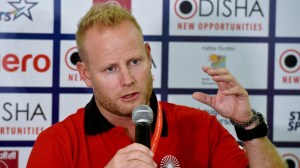Infy chief is quot;compassionate capitalistquot;
BANGALORE, APRIL 11: India's most celebrated billionaire queues up in his office cafeteria, behind a uniformed security guard, steel plate...

BANGALORE, APRIL 11: India8217;s most celebrated billionaire queues up in his office cafeteria, behind a uniformed security guard, steel plate in hand. He fetches his own glass of water and eats the same food as his milling workers.
Infosys began with a seed capital of 230 in 1981, borrowed mainly from the wives of its six founders. It has seen its stock value multiply 100 times since it went public in 1993 and is now scouring the globe for acquisitions.
Employees number more than 5,000, and the market value of the company8217;s Indian shares alone is close to 15 billion. Revenues have grown 65 per cent a year since 1994.
quot;I am a capitalist in mind but socialist at heart,quot; Murthy told Reuters in an interview in his Bangalore office, where the only sign of indulgence are the hundreds of CDs of western classical music. quot;Money has its advantages but I suppose I limit it to books and music,quot; said Murthy, who believes his lower middle class origins make him comfortable with simplicity. He also believes simple lifestyles can help evangelize wealth creation.
Murthy, who was detained for three days by Bulgarian police on suspicion that he was working against the communist government in the 1970s, was spurred by the incident to think afresh about his commitment to socialism.
He reminds some of independence leader Mahatma Gandhi who preached a form of quot;trusteeshipquot; under which industrialists will create wealth but help society. He believes the simple life is necessary quot;so that you don8217;t create tensions in societyquot;.
D V Subbalakshmi, one of the hundreds of young engineers in Infosys who looks up to him, says Murthy at once stands for entrepreneurship and the creation of social good.
quot;He stands for compassionate capitalism.quot;
Infosys has over the years metamorphosed from being a cut-price programming shop to a high-value company grabbing emerging areas like e-commerce. It counts among its clients Fortune 500 firms such as Boeing Co and Dell.
It has on the side set up a foundation which carries outsocial work like slum development. Murthy8217;s management style is focused and enthusiastic.
quot;We have a non-hierarchical organisation8230;and on Friday,he will come in jeans, like everybody else,quot; said Aditi Madhok, an employee.
TRIUMPH OVER ADVERSITY
Murthy and his friends nearly gave up in 1990 as socialist controls stifled their ambitions to become world class.
quot;I must be very honest8230;I don8217;t think we foresaw Infosys would be such a success,quot; Murthy said.
quot;We were living from month to month and there were times when we had to borrow to pay salaries.quot;
quot;I was probably the only one who had this unbridled enthusiasm, the confidence that we will somehow make it. I think that8217;s how I told all of my colleagues then that I will buy all of them out. Not that I had any money,quot; Murthy said.
Fortunes reversed in 1991, when India launched afree-market reform programme after a foreign exchange crisis.
- 01
- 02
- 03
- 04
- 05































